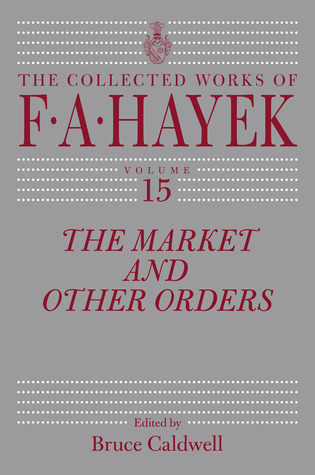
In addition to his groundbreaking contributions to pure economic theory, F. A. Hayek also closely examined the ways in which the knowledge of many individual market participants could culminate in an overall order of economic activity. His attempts to come to terms with the “knowledge problem” thread through his career and comprise the writings collected in the fifteenth volume of the University of Chicago Press’s Collected Works of F. A. Hayek series. The Market and Other Orders brings together more than twenty works spanning almost forty years that consider this question. Consisting of speeches, essays, and lectures, including Hayek’s 1974 Nobel lecture, “The Pretense of Knowledge,” the works in this volume draw on a broad range of perspectives, including the philosophy of science, the physiology of the brain, legal theory, and political philosophy. Taking readers from Hayek’s early development of the idea of spontaneous order in economics through his integration of this insight into political theory and other disciplines, the book culminates with Hayek’s integration of his work on these topics into an overarching social theory that accounts for spontaneous order in the variety of complex systems that Hayek studied throughout his career. Edited by renowned Hayek scholar Bruce Caldwell, who also contributes a masterly introduction that provides biographical and historical context, The Market and Other Orders forms the definitive compilation of Hayek’s work on spontaneous order.
Author

Friedrich August von Hayek CH was an Austrian and British economist and philosopher known for his defense of classical liberalism and free-market capitalism against socialist and collectivist thought. He is considered by some to be one of the most important economists and political philosophers of the twentieth century. Hayek's account of how changing prices communicate signals which enable individuals to coordinate their plans is widely regarded as an important achievement in economics. Hayek also wrote on the topics of jurisprudence, neuroscience and the history of ideas. Hayek is one of the most influential members of the Austrian School of economics, and in 1974 shared the Nobel Memorial Prize in Economics with Gunnar Myrdal "for their pioneering work in the theory of money and economic fluctuations and for their penetrating analysis of the interdependence of economic, social and institutional phenomena." He also received the U.S. Presidential Medal of Freedom in 1991 from president George H. W. Bush. Hayek lived in Austria, Great Britain, the United States and Germany, and became a British subject in 1938.